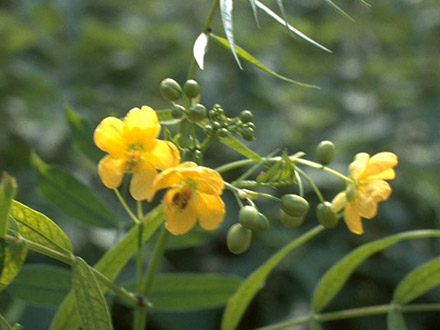Botanical name
Alexandrian Senna - Senna alexandrina Mill.
Family
Bean family (Caesalpiniaceae)
Information about the plant
Two different senna plants were originally used medicinally from the genus Cassia within the subgenus of senna: Cassia senna L. (Syn. Cassia acutifolia Delile - Alexandrian- or Khartum-Senna) and Cassia angustifolia Vahl. (Tinnevelly-Senna). The subsequent rise of the subgenus senna to its own genus of senna also had consequences for these two species. Their generic name is now consistently senna - the two species are morphologically and microscopically distinguished only marginally by the ingredients - and they have become pooled as Senna Alexandrina Mill. The distribution of Alexandrian Senna extends to the warm, dry areas of northern central Africa via Sudan, Egypt, and east to South India via Arabia.
The Alexandrian Senna is a 60cm to 2m tall shrub with five-to nine pairs of pinnate leaves. The leaflets are linear to lanceolateand up to 6 inches long. The original epithets from Latin "acutifolius" (= pointed leaves) "angustifolius" (= small leaved) refer to the shape of these leaflets. The pale yellow flowers are zygomorphic leaf axils in clusters. The fruits are up to 5cm long husks.
Medicinally used parts of plants (herbal drug)
The dried leaflets and dried fruits (pods) are used. The commercial drugs come mainly from Sudan and India.
Constituents of the herbal drug
Senna leaves and senna pods contain anthranoids (hydroxyanthracene derivatives, "anthraquinones"), mainly sennosides A to D (Dianthronglucoside).
Quality of the drug
The quality of the following drugs or drug preparations is specified in the European Pharmacopoeia (Ph. Eur.):
- Senna leaves (senna folium)
- Alexandrian senna fruit (senna fructus acutifolia)
- Tinnevelly senna fruit (senna fructus angustifoliae)
- Standardised senna leaves dried extract (senna folii extractum siccum normatum)
Medical applications
Recognised medical use
For constipation (Commission E) for the short-term treatment of occasional constipation (ESCOP). Clinical data covered the following areas of use (approved): short-term use for constipation. The HMPC has accepted the internal administration of senna leaves and senna fruit for the short-term treatment of occasional occurring constipation as "well-established medicinal use".
Traditional use
No listing as a traditional use (§ 109a)
Herbal drug preparations in finished dosage forms
- chopped leaves or fruit as a tea
- powdered leaves or fruits into granules, tablets and capsules
- senna fruit dried extract (extractant water or ethanol 60%) standardised on anthranoids (sennoside B) in pills, tablets and instant teas
Dosage
Prepared drugs: see package insert;
Tea infusion: 20 to 30mg per day of anthranoids is sufficient for the laxative effect. This is attained as a tea infusion of 0.75 to 1.5g cut senna or senna fruits. The tea is to be taken in the evening before bedtime. It is useful in combination with other drugs such as alder bark (also acts as a laxative) or cumin (flatulence).
Preparation of a tea
Pour approximately 150ml of hot (not boiling) water over 0.75 to 1.5g of finely chopped senna or senna fruits and strain after 10 to 20 minutes.
Notes
Senna pods and senna fruit may not be used for longer than 1 to 2 weeks (gut-irritating laxative), long-term use increases constipation. Senna leaves or senna pods should not be taken for intestinal obstruction, appendicitis, inflammatory bowel disease (e.g. Crohn's disease, ulcerative colitis), abdominal pain of unknown origin and severe dehydration symptoms. A slight discoloration of urine may occur while taking senna leaves and senna pods. Although until now there have been no reports of adverse or harmful effects by senna leaves or senna pods in pregnant women and on the foetus, it is not advisable to take senna leaves or senna pods during pregnancy because of the potential genotoxic properties of various anthranoids. The transfer of anthranoids into the breast milk cannot be excluded, so that even a dose of senna leaves and senna pods is not recommended while breast-feeding. Likewise, children under 12 years old should not take senna leaves or senna pods.
Side effects
Rarely gastrointestinal cramp complaints (reduce dosage!). The prolonged ingestion of senna leaves or senna pods (laxative abuse) can lead to problems with the water and electrolyte balance, especially potassium loss. There may also be blood and protein in the urine (proteinuria, hematuria). Chronic use leads to (reversible) pigment deposition in the intestinal mucosa.
Interactions
The chronic use of senna pods and senna leaves (laxative abuse) can increase the impact of digitalis drugs (drugs with cardiac glycosides) with the potassium deficiency, the effect of antiarrhythmic drugs may also be affected. By simultaneous use of thiazide diuretics, adrenal corticosteroids and liquorice root can further enhance the loss of potassium.
References
Herbal drug monographs
HMPC, Commission E, ESCOP, WHO (Vol. 1)
Further literature
Wichtl: Teedrogen und Phytopharmaka, pg. 613, pg. 619
Schilcher: Leitfaden Phytotherapie, pg. 239
Van Wyk: Handbuch der Arzneipflanzen, pg. 298
Kommentar zum Europäischen Arzneibuch (Senna leaves, no. 206; Senna leavdried extract, no. 1261; Alexandrian senna pods, no. 207; Tinnevelly senna pods, no. 208)


